How to Get Rid of Wasps with Vinegar & Vengeance
Author: Anne Cowart | Editor: Omar Alonso
Review & Research: Jen Worst & Chris Miller
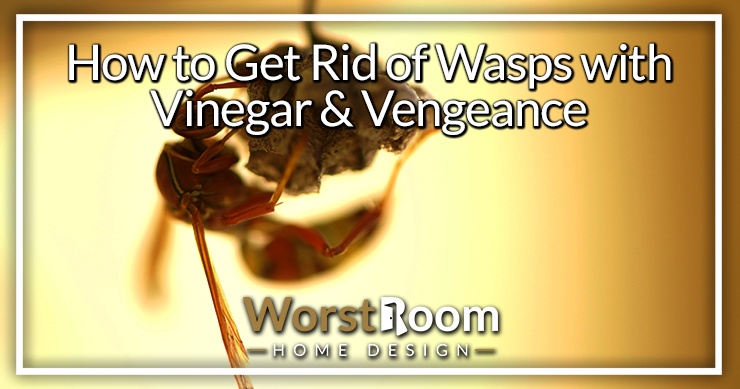
If you've noticed wasps around your home and they're starting to go after your food, you need to know how to get rid of the nest. Wasps are a nuisance and can be dangerous when entering your personal space. As such, it's crucial to know how to get rid of wasps with vinegar.
With vinegar, you don't need to invest in expensive insecticides to kill off the wasps. It is enough to eliminate the wasps without harming you or the environment. The cost of vinegar for home usage is also quite affordable.
Additionally, this home remedy is easy to implement. Wasps are known to incorporate a strong sense of smell to assist them in finding food. On the other hand, vinegar has a pungent smell that the wasps can be sensitive to. As such, you can use this smell to your advantage. Because the vinegar smell is strong, it will keep the wasps at bay.
Keep reading the following guide to understand more about this effective solution. You can use vinegar to keep birds off your porch as well, so keep some around for cleaning and other reasons!
How To Get Rid of Wasps With Vinegar
After obtaining a thorough understanding of wasps, you can now proceed with how to get rid of wasps with vinegar. Does vinegar kill wasps? You bet, nearly immediately on contact. There are two ways to implement this effective procedure. Keep scrolling the page to know more.
Method 1 - Easier But Less Effective
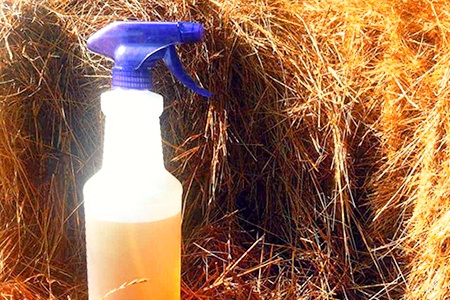
This first method applies to household owners who want to avoid destroying the environment and killing insects. Following the steps below will assist you in eliminating wasps temporarily without the need to kill them.
What You Need
There are simply a few household products you likely already have on hand to collect:
- Apple cider or white vinegar
- A spray bottle to contain the vinegar
- Water
Once you’ve collected these household items, you’re ready to move into the main procedure.
Procedure
This is a very simple procedure you can’t possibly mess up:
- Mix equal amounts of vinegar and water.
- Proceed to pour the obtained solution into a spray bottle.
We are now ready for the vinegar application.
How To Use
Now that you have all the items needed, it's time to begin the process. Spray the vinegar solution in the places where you have noticed the wasps. The mixture won't permanently kill the wasps but will temporarily keep them away.
It's also crucial to note that this solution will lose effectiveness as time passes. As such, you want to ensure you reapply it frequently.
Method 2 - The Sugar Attracts
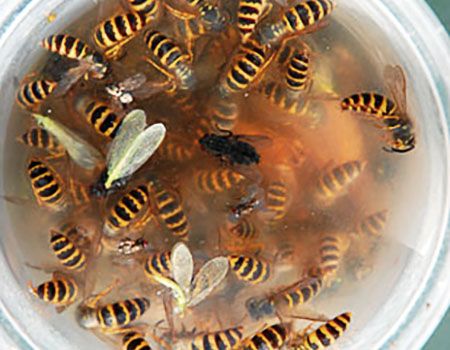
This second method is suitable for those who want to eliminate wasps permanently. It generates a DIY wasp killer. Use this method to eliminate wasps by killing them.
What You Need
If you already have vinegar on hand, you won’t need a trip to the store despite the lengthier size of this list:
- 2 cups of apple cider vinegar
- 2 cups of sugar
- A cup of water
- 1/2 cup of liquid dish soap
- Plastic bottles
- Large bowl
- Spray bottles (optional)
Once your ingredients and tools are gathered, you’re ready to create your mixture.
Procedure
Please read the entire procedure once through all the way, then read each step again as you go through them.
- Pour the water (one cup) into the large bowl.
- Add the apple cider vinegar and liquid soap to the water.
- Add the sugar to the mixture and ensure you don't form bubbles.
- Transfer the mixture to the spray or plastic bottles.
And now we explain how to use this recipe you’ve created.
How To Use
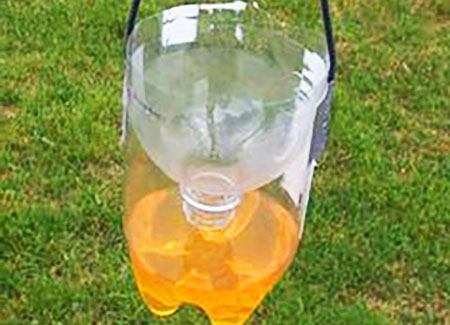
First, you need to identify the specific wasps that are a nuisance. Then, make sure to saturate them with the mixture until they cease movements. The other option is to use the mixture directly on wasp nests to eliminate them. That's how to get rid of wasps with vinegar with a vengeance.
If you want to attract these insects, make a wide opening on the plastic bottles by cutting them. You can then use strings to tie the bottles to a tree or post where the wasps will likely visit. Since wasps love sugar, they will be attracted and trapped in the bait. The dish soap and vinegar will dissolve their coating and kill them.
Another way to do this is to cut a two liter bottle in half and insert the top half upside down into the bottom half so that it forms a funnel. Pour your solution in the bottom half and wasps will crawl through the funnel and not be able to escape since they'll cling to the outer perimeter of the bottle rather than flying back up out of the funnel tip that's in the center.
How to Prevent a Wasp Infestation
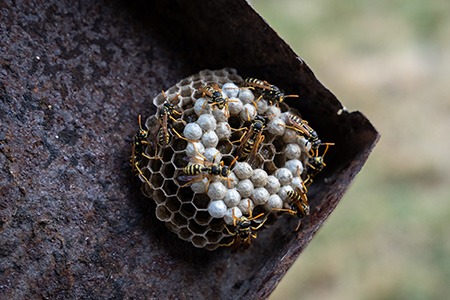
No matter which method you choose, it is crucial to know the following tips and tricks. These recommendations will help you prevent a wasp infestation in the future. There's so much you can do. Even in your garden you can grow plants that repel mosquitos, ticks, fleas, and other pests.
Dispose of Unwanted Food Appropriately
This tip goes to both homeowners and business establishments. Wasp infestations are common in those places that have a lot of food. As such, you’ll want to take precautionary measures and eliminate any leftover pieces of food on time.
Sweet and protein-rich foods attract wasps which can also make them imprint such food sources. Ensure you don't leave food for the wasps to find and eat.
Incorporate a Fake Nest
Since wasps are territorial, they'll avoid constructing a nest next to another wasp nest. Using fake nests as a deterrent is a great idea. You can make these nests using different materials.
Close All Entry Points
Wasps are naturally attracted to open and accessible spaces. As such, it's crucial to close all entry points, such as unsealed vents, cracks, and crevices. This way, the wasps won't have access to their nest. You need to also seal entry into your waste bins and compost bins (but maggots in compost is okay to a degree).
Don't Squash or Swat Wasps
If you have accidentally encountered a wasp, don't squash or swat them. Squashing or swatting the wasps doesn't deter the insects but does the opposite.
Why is this so? When you swat a wasp, they die and proceed to release a chemical that attracts more wasps and incites them to attack.
The Difference Between Wasps & Bees
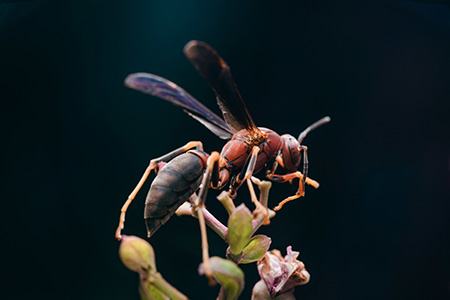
Bees are not wasps. Still, the two insects have similar characteristics. They both have wings and stings that they use to sting their prey. Furthermore, they both inhabit the same types of environments. However, there are specific features that differentiate them.
- Wasps feature a narrow waist, commonly known as the petiole.
- Wasps have shiny and bald bodies. On the contrary, bees are hairy.
- Most wasps incorporate yellow and black bands and a pointed abdomen. Bees instead have a non-distinct brown band on their abdomen.
- Wasps use a single hole to enter and exit their nests. On the other hand, bees have multiple entrances and exit holes. This characteristic is especially true for masonry bees.
Vinegar will get rid of bees the same as wasps, so throughout this process you may not ever realize you’re dealing with a bee problem. All the same! Your problem will be solved.
Wasp Venom
This is another interesting feature when comparing bees and wasps. Both bees and wasps possess painful venom. However, most bee species will not trigger an attack unless they sense a threat. The same case applies to wasp species.
A good example is the cicada killer wasp which won't sting unless you try to attack it. Most cicada males don't possess a stinger. On the contrary, wasps like the yellow jacket and hornet sting without hesitation since they are more aggressive.
Wasp venom won't kill you (except in sever allergic reactions) but will cause irritation and pain since it is poisonous. Some victims also experience nausea and vomiting. The reaction to this venom also varies since it can be mild or serious. Some individuals may experience more severe cases, especially with wasp venom allergies.
FAQs Regarding Vinegar for Wasps
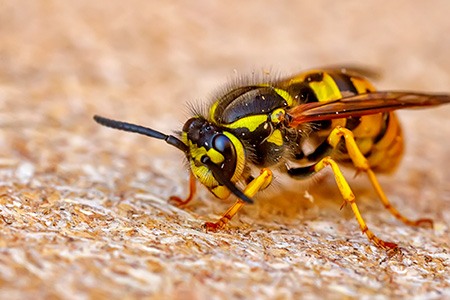
This section will answer the most-asked questions regarding wasps and how to get rid of them. Please continue reading below if you have more questions and seek more information.
Are Wasps Attracted to Vinegar?
No, wasps are not attracted to vinegar. It's quite the opposite in that they know to stay away from acidic liquids and smells. People may think vinegar is attractive because most DIY vinegar mixtures meant for wasps include sugar, which does attract them.
What Types of Smells Do Wasps Hate?
In general, wasps don't like any fragrance that contains mint. For example, they will be disturbed with scents from peppermint and spearmint oils, pine, and citrus. These insects hate strong smells released by essential oils like rosemary, eucalyptus, lemongrass, clove, and thyme.
The other smell that wasps hate is the smell of vinegar. Vinegar is a very acidic substance, which is not palatable to wasps.
What's the Best Home Remedy to Repel Wasps?
In general, vinegar is a fantastic home remedy that repels wasps. However, some other essential oils and fragrances will keep wasps away. Here are some tips: use essential oils like lavender, peppermint, sage, and lemon. The suggested dilution is a drop or two at a time to achieve the desired scent. You can also put it in your backyard if you're closing off this space.
You can also use a commercial wasp deterrent formulated for the desired area. It would be best if you used it according to the label direction.
Do Wasps Sting?
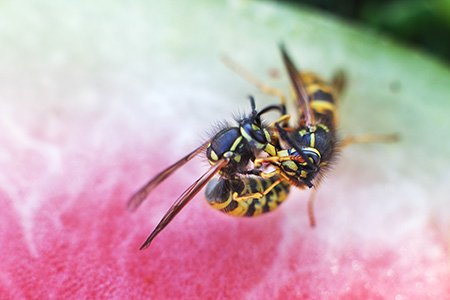
Yes, wasps do sting. Some wasps will sting if they feel threatened or disturbed. Others will sting out of territoriality. However, this is the exception. Usually, wasps don't sting unless they must protect themselves from hostile organisms or substances. As such, you should be very careful with wasps in your house.
Will Vinegar Kill Yellow Jackets?
Yes, vinegar will kill yellow jackets. Yellow jackets are a type of wasp and they suffer the same, life-ending allergic reaction to vinegar as other types of wasps do.
And That’s How To Get Rid of Wasps With Vinegar!
Vinegar is a helpful substance in keeping wasps away. It is not only very affordable but also easy to come by. It is also a safe method for eliminating these insects. However, you should do it carefully. You'll need to know the wasps' favorite food sources and the best time to apply this natural substance.
Nevertheless, the vinegar smell is very offensive to wasps, and they will avoid it. As such, using the methods above will keep wasps away from your home, and you can enjoy your wasp-free weekend. And that's how to get rid of wasps with vinegar!




